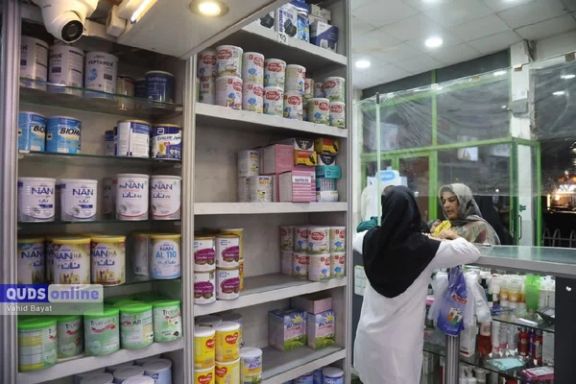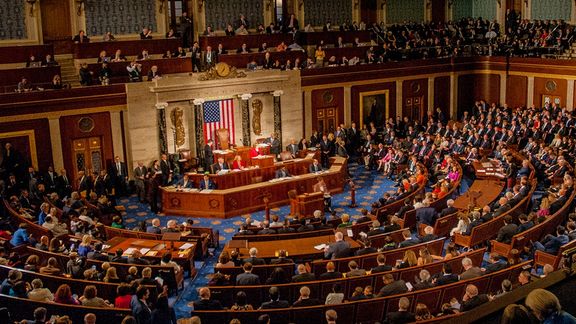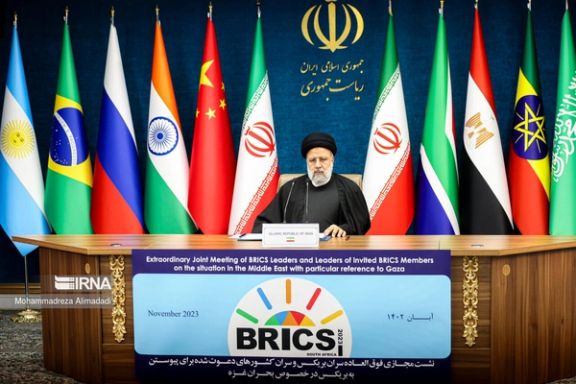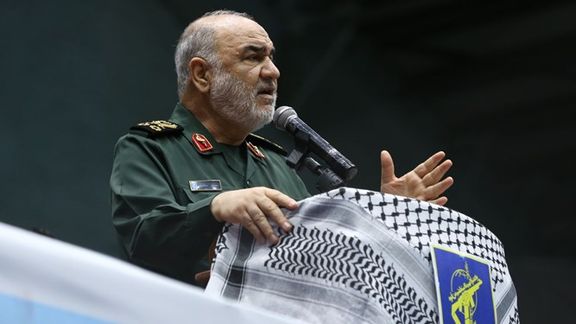Shortage Of Powdered Milk Continues In Iran With Lack Of Imports

Shortages of powdered milk and baby formula continue in Iran, as prices jump by at least 40 percent because the government has not provided foreign currency for imports.

Shortages of powdered milk and baby formula continue in Iran, as prices jump by at least 40 percent because the government has not provided foreign currency for imports.
The shortages began in March and reports in local media say most pharmacies and drug stores have run out of locally produced and more affordable powdered milk. Factories in Iran rely on imports of raw materials to produce powdered milk, which in turn need foreign currency allocation by the government.
Imports of major foodstuff, medication and other necessities depend on the government providing around $15 billion of foreign currency annually, but allocations have been slow in the past two years and prices have skyrocketed.
Reports indicate that baby formula packaged abroad and imported in small quantities is available, but each package costs up to $15, which most Iranians cannot afford. Average monthly wages for workers is $150 and food price inflation has been running at around 80 percent in the past two years.
Media in Tehran have also been reporting shortages of medication, while some government officials periodically deny any problems. The government allocates around $3 billion to import raw material for pharmaceutical products.
It is difficult to explain the government’s reluctance to provide sufficient foreign currency for imports of essential goods, when it says its oil exports have increased. The United States also agreed recently to allow around $16 billion of Iran’s frozen funds to be unblocked.

The US House of Representatives passed a bill Thursday that would permanently freeze Iran’s $6 billion, released as part of a prisoner swap deal in September.
The bill, named the No Funds for Iranian Terrorism Act, is yet another Congressional move aiming to pressure the Biden administration to harden its stance on Iran. Ninety Democrats joined all but one of House Republicans to pass the bill 307-119.
Rep. Michael McCaul, who introduced the bill, slammed the administration for making funds available to a government that sponsors Hamas, questioning the administration’s motive.
“There’s something else going on here,” McCaul said, “a deal we don’t know about,” suggesting that the Biden administration may have released the $6 billion to help bring about another nuclear agreement with Tehran.
Republicans have been opposing the ‘hostage deal’ ever since it was announced in August, but their opposition has intensified since October 7, when Hamas attacked Israel, killing 1,200 and taking more than 200 hostage.
“The idea that you can just take Hamas and keep it separate from Iran has always been a farce,” said House Majority Leader Steve Scalise. “Iran funds Hamas, and everybody knows it… We shouldn't even need the bill. The administration should be standing there saying we're not giving them the money anymore.”
But those close to President Biden argue that releasing the $6 billion had been necessary and key to securing the release of five Iranian-American hostages.
“Every member of Congress who was aware of these cases wanted our fellow citizens home,” said Rep. Gregory Meeks, ranking member of the House Foreign Affairs Committee. “Reneging on the deal would hurt U.S. global credibility.”
Biden critics say the deal has sent a signal that the US government would “reward hostage-taking”. They accuse Biden of emboldening the regime in Iran as well as its proxies across the Middle East.
Since mid-October, when Israel began its onslaught on Gaza, Iranian-backed groups have launched dozens of attacks on US forces in Iraq and Syria. And from Yemen, the Houthis have been launching drone and missile attacks.
Not surprisingly, the bill was amended Thursday to state the Iranian-backed Houthis are benefitting from the Biden administration’s failure to condemn them, and perhaps more importantly, prohibit the use of US federal funds for Iran.
“There is only one language that is understood by our adversaries,” Rep. Keith Self said on the House floor in support of the bipartisan bill, “that is strength.”
The bill will have to pass the Senate, which is not likely given the Democratic majority in the upper chamber. But if it were to pass and turn into law, it would impose new sanctions to prevent any transfer of money to Iran.
Republican lawmakers in both chambers are aggravated by what they see as President Biden’s soft approach to Iran. Some have gone so far as to call his policy “appeasement.”
“This administration has subverted Israel and boosted Iran for nearly 3 years,” Senator Ted Cruz posted on his X account. “Rob Malley, who headed up his nuclear negotiations with Iran, had Iranian spies working under him at the State Department.”
On Thursday, 25 Senators signed an open letter to oppose the administration’s sanctions relief to Iran.
Addressing the three secretaries of State, Defense and the Treasury, the Senators (led by Senator Tim Scott) conveyed displeasure at the fact that despite attacks on American troops, “it is business as normal on the economic front."
The letter reads: “We therefore request that your departments provide us with a classified assessment on the administration’s plan to deter Iranian aggression and prevent the escalation of conflict in the Middle East. This assessment should be provided in a member or staff-level briefing no later than December 7, 2023.”

The Belgian police are beefing up security measures to protect Darya Safai, an Iranian-born member of parliament, following death threats she received on social media.
In an interview with Iran International, Safai said that the death threats against her have increased following the Israel-Hamas conflict.
“I should be careful and report any suspicious events around me” to the police, the lawmaker wrote on X.
The police has launched a probe into the nature and sources of the threats.
Safai blamed Islamists for the threats, vowing that she will continue to stand up for freedom.
“It’s incomprehensible that people should make serious threats … instead of responding with substantive arguments. But that is just how Islamists operate,” read her post on X.
Speaking to Iran International, she accused the Iranian regime of orchestrating the threats by promoting Islamist extremism in Belgium and the whole of Europe.
Safai warned that Tehran is trying to target its opponents indirectly under the guise of backing the Palestinian cause.
The alarming rise of extremism and antisemitism have raised serious concerns among European countries, with many of them blaming the Islamic Republic for fostering such activities.
In October, The Times warned that Iranian agents are stirring up unrest in the UK through Gaza protests.
There is direct involvement of the Iranian regime through the physical presence of operatives at protests as well as through disinformation campaigns conducted online, the newspaper said.
Earlier in November, German authorities executed raids on 54 locations connected to the Islamic Center of Hamburg (IZH), suspected of supporting Iran-backed Hezbollah.
On November 4, Safai condemned attempts to silence her with the label of “Islamophobe,” especially since the current conflict began in the Middle East.
“What the world is experiencing today is much broader than a war between Israel and Hamas. It is a broad war that shows the direction for certain Muslims to ultimately achieve their goals,” she said earlier this month, highlighting the Muslims’ promised goal to conquer the world and establish an Islamic rule.
Last November, Iran International was warned by London Police that its journalists were under threat from Iranian agents and the police took measures to strengthen security around the network’s offices. A man was arrested in the vicinity of Iran International’s headquarters in February and charged with a terrorism offence.
Safai has been one of the most vocal European lawmakers critical of the Islamic Republic, advocating a tougher stance towards Tehran and its regional and international policies.
She is also one of the staunch supporters of listing Iran’s Revolutionary Guard (IRGC) as a terrorist organization.
Safai told Iran International on Thursday that she has been under police protection since June after she criticized a formal invitation extended to Alireza Zakani, the mayor of Tehran, to visit Belgium. Her criticism angered Iranian officials, with some reports saying that they might try to target anti-regime activists and figures who openly opposed Zakani’s visit.
Tehran’s mayor was a hardliner member of parliament before becoming a candidate in the 2021 presidential election and withdrawing in favor of the current president Ebrahim Raisi. He also served as the head of IRGC’s Student Basij paramilitary forces and had a prominent role in cracking down on students during popular protests in July 1999.

Iran's president claims he will not attend the United Nations Climate Change Conference (COP28) in Dubai, citing the presence of his Israeli counterpart.
Israeli president Isaac Herzog will be in the United Arab Emirates along with around 140 other world leaders for the world's biggest climate summit which begins Friday, to be opened by Britain's King Charles.
Fars News Agency, known for its proximity to the Islamic Revolutionary Guard Corps (IRGC), reported on Thursday that Raisi will not only be absent from the conference but will also not have a representative attending on his behalf.
According to the report, Iran will only participate in the conference at the ministerial level, with the representation led by the minister of energy.
The UAE and Israel normalized relations during the presidency of Donald Trump in the United States when in 2020 the Abraham Accords opened diplomatic ties along with other Arab nations such as Bahrain.
During Herzog's inaugural visit to the UAE last year, the Iran-backed Houthis in Yemen sent a ballistic missile to the Persian Gulf state amidst a period of attacks which killed three. The missile was intercepted by the UAE.
The Houthis' military spokesman said they fired Zulfiqar missiles at Abu Dhabi and launched drones at Dubai.

As the Israel-Hamas truce sees a one-day extension, Iran has issued a renewed threat of war against the United States and Israel.
"We fight against America, Israel, and anyone who challenges the grandeur of the Islamic Republic," said the Commander of Iran's Islamic Revolutionary Guard Corps, Hossein Salami on Thursday, repeating a well-trodden narrative against Iran's archenemies.
It is the latest rally cry amidst the war between Israel and Hamas, initiated by the Hamas invasion on October 7, which resulted in at least 1,200, mostly civilians losing their lives, and an additional 240 taken hostage. Retaliatory attacks have left over 15,000 dead in Gaza, with hundreds of thousands displaced.
The current ceasefire, initially set to expire, has been extended by one day, meaning a further 10 hostages and three bodies will be returned to Israel and around 30 more Palestinian prisoners in Israeli jails released. The extension comes after Israel received a list of women and children for potential release, according to the Israeli government.
Iran, a long-time supporter of Hamas both financially and militarily, has refrained from direct involvement in the Gaza war beyond its leaders and commanders' rally cries and incitement. However, its proxy forces continue attacks, citing perceived US support for Israel. At least 60 attacks on US forces have taken place since October 7, and Israel has come under attack from proxy militias in Yemen, Lebanon, Syria and Iraq.
Critics of US President Joe Biden argue that his Iran policy has emboldened the regime and its proxies, who perceive minimal consequences for their actions. While the US military has launched less than a handful of retaliatory attacks in Syria and Iraq, Iran's Revolutionary Guard, controlling proxy forces, has not been targeted.

Police in Tehran have been impounding cars in the latest crackdown against ongoing hijab violations.
Iranian officials confirmed the issuance of police warnings through text messages, alerting citizens to the imminent seizure of vehicles for failing to adhere to compulsory hijab rules. The police directive reportedly extends to over a million citizens, with hundreds of cars confiscated and temporarily prohibited from use.
Amidst a growing crackdown on hijab defiance, Iranian parliamentarians have expanded the government's Hijab and Chastity bill. The proposed legislation, seeking stricter penalties for hijab infractions, faces widespread criticism from human rights groups.
The intensified enforcement of hijab regulations follows protests that have swept across Iran since the death of Iranian-Kurd Mahsa Amini last year. Amini's arrest in Tehran, allegedly for breaching the Islamic republic’s mandatory hijab, ignited the worst uprising of recent history.
Women across the country have been defying the mandatory hijab which has been met with a heavier presence of hijab enforcers in public spaces such as subway stations. Additionally, surveillance cameras have been installed to identify and apprehend individuals violating hijab regulations.